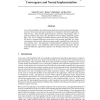Free Online Productivity Tools
i2Speak
i2Symbol
i2OCR
iTex2Img
iWeb2Print
iWeb2Shot
i2Type
iPdf2Split
iPdf2Merge
i2Bopomofo
i2Arabic
i2Style
i2Image
i2PDF
iLatex2Rtf
Sci2ools
143
click to vote
NIPS
2008
2008
Temporal Difference Based Actor Critic Learning - Convergence and Neural Implementation
Actor-critic algorithms for reinforcement learning are achieving renewed popularity due to their good convergence properties in situations where other approaches often fail (e.g., when function approximation is involved). Interestingly, there is growing evidence that actor-critic approaches based on phasic dopamine signals play a key role in biological learning through cortical and basal ganglia loops. We derive a temporal difference based actor critic learning algorithm, for which convergence can be proved without assuming widely separated time scales for the actor and the critic. The approach is demonstrated by applying it to networks of spiking neurons. The established relation between phasic dopamine and the temporal difference signal lends support to the biological relevance of such algorithms.
Information Technology | NIPS 2008 | Phasic Dopamine | Phasic Dopamine Signals | Temporal Difference |
Related Content
| Added | 29 Oct 2010 |
| Updated | 29 Oct 2010 |
| Type | Conference |
| Year | 2008 |
| Where | NIPS |
| Authors | Dotan Di Castro, Dmitry Volkinshtein, Ron Meir |
Comments (0)

